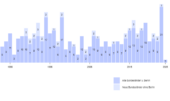According to a media report, the US army is stockpiling cluster munitions for Ukraine in a depot in Rhineland-Palatinate. But the Oslo Agreement, however, probits transport through and storage in Germany.
The US Army stores cluster munitions in the Miesau ammunition depot (Rhineland-Palatinate), which are banned in Germany under the Oslo Agreement. This was reported by the ARD magazines “Panorama” and “STRG_F” with reference to the US Army. The ammunition is to be delivered to Ukraine.
When asked by the two media, Defence Minister Boris Pistorius (Social Democratic Party, SPD) stated that he knew nothing about the storage and transport of the cluster munitions. However, a spokesman for the US Army confirmed in writing that the M864 and M483A1 cluster munition types were being stored and that all munitions movements were being coordinated with the German National Movement Control Centre (NMCC), which was therefore informed of the events.
The German Ministry of Defence emphasises that the Bundeswehr has no specific information about the types of ammunition, only a rough classification. “It is not possible to draw any conclusions about specific types of ammunition from this,” said a spokesperson. But the US Army told “Panorama” and “STRG_F” that the NMCC received precise documentation of the contents of the loads.
Cluster munitions are outlawed because of their dangerous effects on civilians. Their shells open and release dozens or hundreds of deadly mini-bombs, depending on the model. These “submunitions” can hit indiscriminately and, even if they have not exploded, can still be deadly years later. According to the organisation Handicap International, almost 25,000 civilian victims of cluster munitions were registered between the 1960s and 2022.
If the German government is aware of the storage and transport of cluster munitions, this could constitute a violation of the Oslo Convention. Germany signed the agreement in 2008 and transposed it into national law in 2009. It prohibits the storage and transport of cluster munitions. In August 2023, the Bundestag’s scientific service confirmed in an expert report that there is a ban on the transit of cluster munitions across German territory.
Published in German in „nd“.
Image: Cluster munitions can contain dozens or hundreds of small explosive devices that remain dangerous for years if they do not explode (Petar Milošević, CBU-87 cluster bomb used in NATO aggression on Yugoslavia (bomb expired in 1997, used in 1999), CC BY-SA 4.0).





Leave a Reply